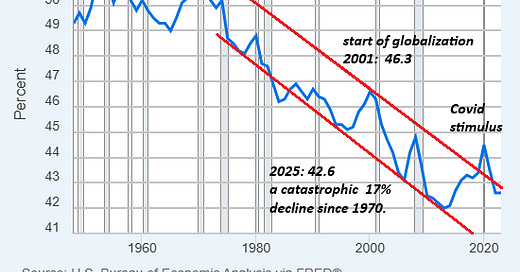I have endeavored to explain how our economy has changed dramatically over the past 50 years beneath the surface. Nothing that's going to happen in the future will make sense unless we understand this, so refill your beverage of choice and let's go through what changed.
Wages gained ground 1945 - 1975, and lost ground 1975 - 2025. In the "glorious 30" (T…
Keep reading with a 7-day free trial
Subscribe to Charles Hugh Smith's Substack to keep reading this post and get 7 days of free access to the full post archives.



